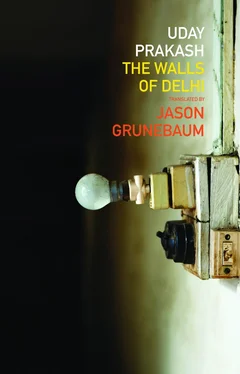Through mists and hunger and flying snow,
Miserable is the man who runs from a dog in his darkness…
And pitiful is the one who holds out his rag of life
To beg mercy of the darkness.
I did the translation in a rush because in front of me are this year’s findings from a World Health Organization report. It contains alarming statistics about millions of children in the developing countries who will fall victim to deadly diseases because of malnutrition, poverty, and squalor.
The report also included startling information about children who have been falling victim to an illness for the past several years that causes the head to grow significantly faster than the rest of the body, causing unnatural behavior. According to doctors, the virus or causes of the disease have yet to be identified, but children who suffer from this disease usually only live to two. According to the WHO, this disease, like AIDS, is spreading rapidly.
But the strangest part of the report came from the Pentagon. A total of sixty seven countries including Ethiopia, Ghana, India, Bangladesh, Iraq, Afghanistan, Bosnia, Palestine, Kosovo, Sri Lanka, Namibia, Nicaragua, and Brazil were home to children who had been born with heads that so quickly got bigger.
And they were even being born in wealthy, developed countries like the US, France, and the UK.
The brains of these children knew everything. They weren’t innocent and wide-eyed like most kids.
The brains of these children were several times bigger than normal for their biological age. And several centuries of living memories were present inside these brains — you could call it a mini flash drive with all history up to the present day. Their DNA was eerily alike.
The Pentagon urged all governments of all countries to keep a close eye on these big-headed kids.
This is how they can be identified:
‘They are in squalor to poor families. Their eyes are red like the eyes of ants. They more or less never sleep. And it is possible they know everything.’
Life was getting better for Uday Prakash when I first met him face-to-face in August, 2005. His ‘Mohandas’ had just been published by the leading Hindi literary magazine Hans, and it was clear that the novella, to steal a phrase from Bollywood, was a superhit. The mobile numbers and postal addresses of Hindi writers are a standard part of back-flap bios in India, just in case readers would like to call and compliment the author on a job well done. And so in the car on the way back from New Delhi’s Indira Gandhi International Airport to his home in nearby Ghaziabad, Prakash received call after call and SMS after SMS from happy fans who wanted to tell him how much they’d enjoyed reading the story. He continually pulled the car over to receive felicitations from a local colleague, or a stranger from elsewhere. Things were changing quickly in India, as Prakash often points out in his stories — and one advantage of mass mobile-phone ownership, if nothing else, has been that lonely poets and writers are able to receive at least a little boost now and again from their readers.
When he and I had first emailed a couple of years earlier about my translating his novel The Girl with the Golden Parasol (Penguin India, 2008), I had little idea about the ‘dark days,’ as Prakash puts it, he was passing through — a period in his life he alludes to at least once in all three stories of this volume. Prakash has always been a popular writer with a huge base of readers: before mobiles, and even in 2005, he received stacks of one-rupee postcards every day from admirers spread across the most forgotten corners of India. (After the publication of ‘Mohandas,’ many postcards simply read, ‘I am Mohandas.’)
Despite his huge, grass-roots fan base, Prakash has always had an uneasy relationship with the Hindi establishment, or any other (in a phrase he likes to use) ‘power centre.’ For most of his professional life, he has worked as a freelance writer, journalist, poet, critic, film maker and producer: anything to provide for his family, at the mercy of the kindness of assignments, rarely able to enjoy the stability that an academic job or government post would have provided. Accused of stirring up caste unrest, called a ‘rabid dog,’ Prakash sustained many attacks from both left and right after the publication of The Girl with the Golden Parasol in 2001 (the novel tells the story of a non-Brahmin boy who falls in love with a Brahmin girl). The plug was pulled overnight on nearly all his freelance jobs. The dark days had begun — and only began to lift years later after the publication of ‘Mohandas’ and the winning of a PEN American Center Translation Fund Award for The Girl with the Golden Parasol in translation.
Uday Prakash was born on New Year’s Day, 1951, in Sitapur, a village on the Son river in the state of Madhya Pradesh. Hindi is his second language: he grew up speaking Chhattisgarhi, a regional language of north India now with its own state, Chhattisgarh. His family were thakurs, or landlords of the village, in a system that was, and is, quite feudal. I have seen Prakash regale a wide-eyed five-year-old in San Francisco with the true tale of the pet elephant he called his companion as a child — and how the elephant used to assist in bathing the young writer with its trunk. Prakash’s own childhood is filled with astonishingly detailed memories of close friends from the village, and the surrounding forest he used to explore — much of which has been decimated after years of deforestation, development, and the forcing off the land of indigenous inhabitants.
Prakash’s mother, Ganga Devi, had come from a Bhojpuri-speaking area near Mirzapur, and had brought with her not only many Bhojpuri songs she often sang at home, but also a facility and abiding love for traditional drawings and illustrations from her region. She painted on the walls and sketched in a notebook she’d kept since she was a teenager. She was skillful, and her art made a deep impression on Prakash, the youngest of her four children, to whom she was very close. After suffering from tracheal cancer, she died two days before Prakash’s thirteenth birthday.
Prakash’s father was an avid reader, had a good education for the time, subscribed to many Hindi magazines, and wrote poetry — all of which spurred Prakash’s own reading and writing habits. After the death of Prakash’s mother, his father began drinking heavily, and it soon became difficult for Prakash to stay at home. Prakash was taken in by a teacher at a nearby town, Shahdol, sixty kilometres away: a tiny hamlet by Indian standards, but as big and strange as a foreign country to Prakash. In an age with bad roads and few bridges, it was quite far from home. He considers the teacher who looked after him a second father, and credits him for helping to guide his studies.
Prakash’s father later developed carcinomas on his cheek and mouth, and Prakash travelled and stayed with him in the city of Indore as he underwent treatment. Before slipping into a coma, his father wrote a letter to a relative, kept by Prakash’s youngest sister, about his fears of what would happen to Prakash. His father was worried that his son lacked sensibility in the ways of the world, and would face terrible problems in the future.
When Prakash’s father died in September 1969, he left to study at the university in Sagar, Madhya Pradesh, and later, in 1975, just after the Emergency period began, moved to New Delhi where he soon began teaching comparative literature and Hindi at Jawaharlal Nehru University. For the next thirty years, he rarely travelled back home. Only recently has Prakash begun returning to Sitapur for longer periods in order spend time with his relatives and childhood friends.
Читать дальше










